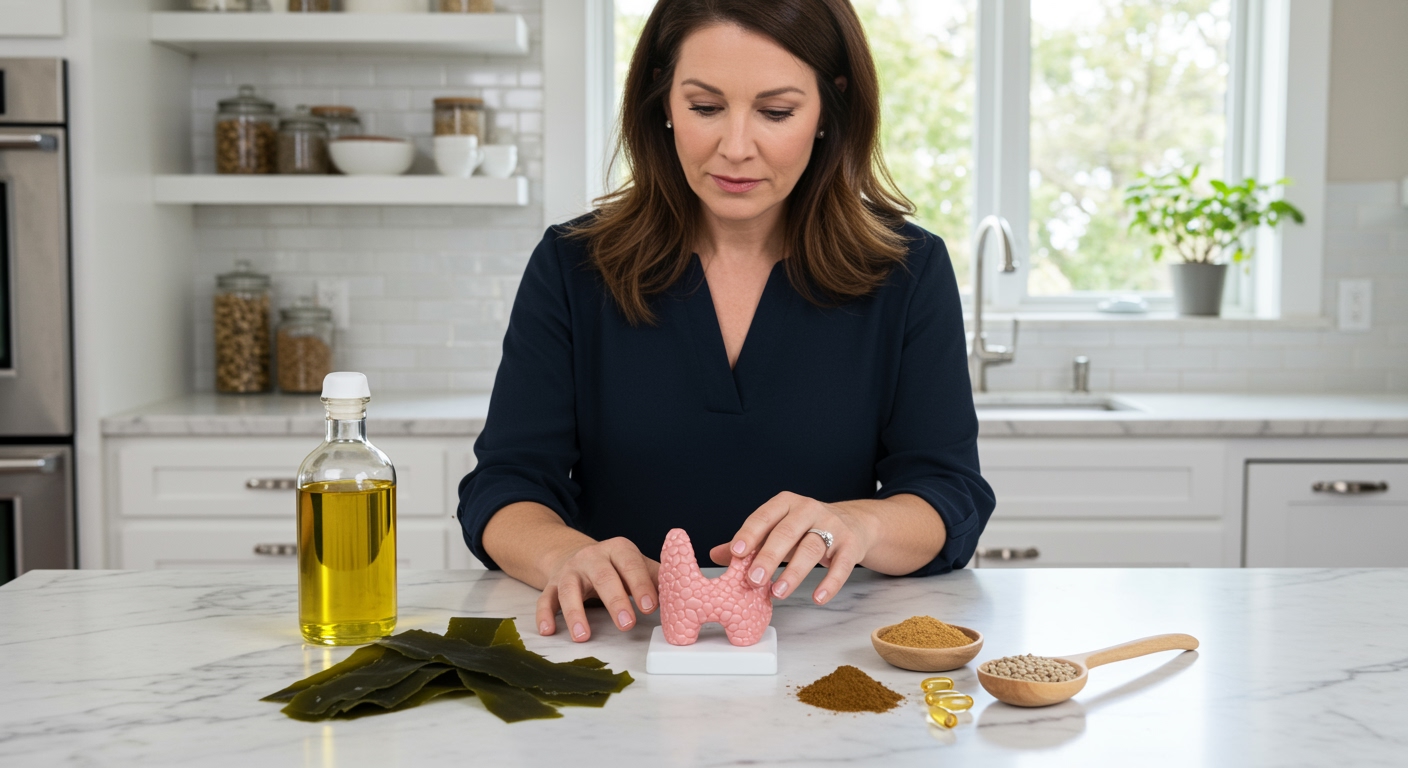✪ Key Takeaway: Algae oil provides omega-3 benefits but may worsen hypothyroidism due to variable iodine content that disrupts thyroid function.
Introduction
You walk down the supplement aisle and see algae oil marketed as the perfect plant-based omega-3 solution.
But when you have hypothyroidism, you wonder if this marine-derived supplement could help your condition or make it worse.
Hi, I am Abdur, your nutrition coach and today I am going to explain how algae oil affects your thyroid function and whether it truly belongs in your hypothyroidism management plan.
What Exactly Is Algae Oil and Why Do People Take It?
Algae oil comes from marine microalgae that naturally produce omega-3 fatty acids called EPA and DHA.
These are the same beneficial fats found in fish oil, but algae oil offers a plant-based alternative for vegetarians and vegans.
Fish actually get their omega-3 content by eating algae, so algae oil goes straight to the original source.
People take algae oil to reduce inflammation, support heart health, and improve brain function without consuming fish.
The supplement industry has grown rapidly because many individuals want omega-3 benefits without the fishy taste or environmental concerns.
However, the connection between algae-based products and thyroid health remains poorly understood by most consumers.
✪ Fact: Fish get their omega-3 fatty acids from eating algae, making algae oil the original source of these beneficial fats.
Does Algae Oil Contain Iodine That Affects Your Thyroid?
The biggest concern with algae oil for hypothyroidism patients is its iodine content, which varies dramatically between products.
Some algae oil supplements contain virtually no iodine, while others derived from kelp or seaweed can have extremely high amounts.
Your thyroid gland needs iodine to produce hormones, but too much iodine can actually worsen hypothyroidism or trigger autoimmune responses.
Research shows that excessive iodine intake can inhibit thyroid hormone synthesis through a protective mechanism called the Wolff-Chaikoff effect.
This means your thyroid temporarily shuts down hormone production when flooded with too much iodine.
For people with Hashimoto thyroiditis, high iodine intake can increase antibody levels and accelerate thyroid tissue destruction.
The problem is that supplement labels rarely specify exact iodine amounts, leaving you guessing about what you are actually consuming.
✪ Note: Algae oil products vary wildly in iodine content, so always check with manufacturers before purchasing if you have thyroid concerns.
Can Omega-3 Fatty Acids From Algae Oil Actually Help Hypothyroidism?
The omega-3 fatty acids in algae oil do offer some anti-inflammatory benefits that could theoretically support thyroid health.
Chronic inflammation plays a major role in autoimmune thyroid conditions like Hashimoto disease.
EPA and DHA from algae oil help reduce inflammatory markers in your body, which might ease the autoimmune attack on your thyroid.
Some studies suggest that omega-3 supplementation can lower thyroid antibody levels in people with autoimmune thyroid disease.
However, these benefits are modest and do not replace proper thyroid hormone replacement therapy with medications like levothyroxine.
The anti-inflammatory effects might help you feel slightly better overall, but they will not correct your hormone deficiency.
Think of omega-3s as a supportive tool rather than a primary treatment strategy for hypothyroidism.
✪ Pro Tip: Use omega-3 supplements as complementary support alongside your prescribed thyroid medication, never as a replacement.
What Are the Risks of Taking Algae Oil With Hypothyroidism?
The primary risk comes from unpredictable iodine levels that could push your thyroid function in the wrong direction.
If your algae oil contains high iodine from kelp or seaweed sources, you might experience worsening fatigue, weight gain, or brain fog.
Some people with Hashimoto disease report increased antibody levels and thyroid inflammation after taking seaweed-based supplements.
Another concern is that algae oil might interfere with your thyroid medication absorption if taken at the same time.
While this interaction is less documented than with calcium or iron, spacing out supplements from medication remains a smart precaution.
You also need to consider that some algae oil products contain added ingredients or fillers that could trigger sensitivities.
The lack of standardization in the supplement industry means quality varies dramatically between brands.
✪ Note: Take algae oil at least four hours away from your thyroid medication to avoid potential absorption interference.
Should You Choose Algae Oil or Fish Oil for Hypothyroidism?
Fish oil generally poses fewer risks for hypothyroidism patients because it contains minimal to no iodine content.
The omega-3 fatty acids in fish oil come from the fish tissue itself, not from iodine-rich seaweed or kelp.
This makes fish oil a more predictable choice when you need consistent omega-3 supplementation without thyroid complications.
However, if you follow a plant-based diet or have ethical concerns about fish products, algae oil can work if you choose carefully.
Look for algae oil products that specifically state they are low in iodine or derived from microalgae rather than kelp.
Contact the manufacturer directly to ask about iodine testing and quality control measures before purchasing.
Your best approach is working with your healthcare provider to determine which omega-3 source fits your individual thyroid management plan.
✪ Pro Tip: Contact supplement manufacturers directly to request third-party testing results for iodine content before making your purchase decision.
The Bottom Line
Algae oil provides valuable omega-3 fatty acids but carries unpredictable iodine risks that make it a questionable choice for hypothyroidism management.
Your thyroid health depends on consistency and predictability, not on supplements with variable effects that might worsen your condition.
I would love to hear your experiences with omega-3 supplements and thyroid health in the comments below, so share your thoughts and questions freely.
References
At NutritionCrown, we use quality and credible sources to ensure our content is accurate and trustworthy. Below are the sources referenced in writing this article:
- PMC: Omega-3 Fatty Acids and Thyroid Health
- Testa Omega-3: Does Algae Oil Contain Iodine
- Frontiers in Endocrinology: Iodine and Thyroid Function
- Paloma Health: Seaweed and Kelp Affect Thyroid
- British Thyroid Foundation: Diets and Supplements for Thyroid Disorders





